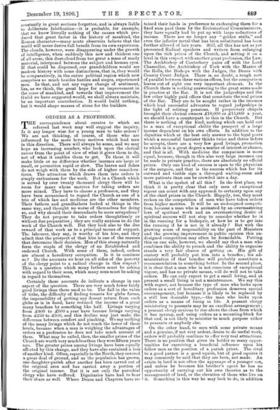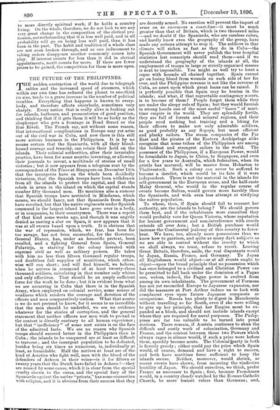ORDERS AS A PROFESSION.
THE correspondence about curates to which we referred last week may well suggest the inquiry. Is it any longer wise for a young man to take orders ? We are not thinking, of course, of those who are influenced by the more heroic motives which lead men in this direction. There will always be some, and we may hope an increasing number, who look upon the clerical career from the point of view of what it gives them to do, not of what it enables them to get. To these it will make little or no difference whether incomes are large or small, or promotion rapid or slow. The loaves and fishes do not weigh with them by the side of higher considera- tions. The attraction which draws them into orders is simply enthusiasm for the work. But in a Church which is served by over twenty thousand clergy there will be room for many whose motives for taking orders are more mixed. They have to choose a profession, and they have been accustomed to regard the Church as one of a trio of which law and medicine are the other members. Their fathers and grandfathers looked at things in the same way, and thought no worse of themselves for doing so and why should their descendants be more scrupulous ? They do not propose to take orders thoughtlessly or without due preparation ; they are really anxious to do the work of the Church well. But they look also to the due reward of that work as to a principal means of support. The labourer, they say, is worthy of his hire, and they admit that the prospect of that hire is one of the reasons that determine their decision. Men of this stamp naturally form the staple of the clergy of an Established and endowed Church. With some of them, indeed, orders are almost a hereditary occupation. Is it to continue so ? Do the accounts we hear on all sides of the poverty of the clergy point to a radical change in this respect ? This is a question which many fathers must be asking with regard to their sons, which many sons must be asking in regard to themselves.
Certainly these accounts do indicate a change in one aspect of the question. There are very much fewer fairly good livings than there used to be. The fall in the value of tithe, the difficulty of finding tenants for glebe farms, the impossibility of getting any decent return from such glebe as is in hand, have reduced the income of a great many benefices by something like half. Livings varying from 4400 to 4800 a year have become livings varying from 4250 to 4500, and this decline may just make the difference between comfort and pinching. We say nothing of the many livings which do not reach the lower of these levels, because when a man is weighing the advantages of orders as a profession he does not take much account of them. What may be called, then, the smaller prizes of the Church are worth very much less than they were fifteen years ago. The greater prizes among livings have been equally affected by this change, and they have also sustained a loss of another kind. Often, especially in the North, they covered a great deal of ground, and as the population has grown, one daughter-parish after another has been carved out of the original area and has carried away a portion of the original income. But it is not only the parochial clergy who have suffered. Dignitaries have had to bear their share as well. Where Deans and Chapters have re- tained their lands in preference to exchanging them for a fixed sum paid them by the Ecclesiastical Commissioners, they have equally had to put up with large reductions of income. There are no longer any "golden stalls," and even the inferior metal that has been substituted has been further alloyed of late years. Still, all this has not as yet prevented Radical speakers and writers from enlarging upon the rich prizes of the Church, and setting it on a level in this respect with another great profession, the Law. The Archbishop of Canterbury pairs off with the Lord Chancellor, the Archbishop of York with the Master of the Rolls, the Bishops with the Judges, the Deans with County Court Judges. There is, no doubt, a rough sort of parallel between these various offices, but the comparison leaves out of sight one very important element. In the Church there is nothing answering to the great sums made in practice at the Bar. It is not the judgeships and the few other highly paid offices that constitute the real prizes of the Bar. They are to be sought rather in the incomes which lead successful advocates to regard judgeships in the light of retiring pensions. If proprietary chapels brought their clerical owners 410,000 or 415,000 a year, we should have a counterpart to this in the Church. But there is nothing of the kind, nothing which can hold out to a man of exceptional ability the prospect of a large income dependent on his own efforts. In addition to the dignities which at the best only answer to the legal posts which EL successful barrister thinks twice and thrice before he accepts, there are a very few good livings, promotion to which is in a great degree a matter of interest or chance, and that is all. With medicine the comparison is more equal, because, though in this also very large incomes can be made in private practice, there are absolutely no official prizes. Only one kind of success is open to the physician or the surgeon, and that is the success which has for its outward and visible sign a thronged waiting-room and more patients than can be crowded into a day.
What is the upshot of all this In the first place, we think it is pretty clear that only men of exceptional vigour can count with any approach to certainty upon any of the chief prizes in the Church. Happily, too, they must reckon on the competition of men who have taken orders from higher motives. It will be an undesigned competi- tion, because a man who is animated by an overmastering love of spiritual work and an overmastering desire of spiritual success will not stop to consider whether he is in the running for a bishopric, or how he is to get into the running if he is not in it already ? But with the growing sense of responsibility on the part of Ministers and the growing improvement in public opinion this un- designed competition may often be formidable. Putting this on one side, however, we should say that a man who combines the ability to preach and the ability to organise stands a very fair chance of getting on. His gift of oratory will probably put him into a benefice; his ad- ministration of that benefice will probably constitute a recommendation to something better. In the second place, it is clear that a man who is not conscious of exceptional vigour, and has no private means, will do well not to take orders. He can only expect to get a small living, and at present a small living is not a maintenance. We say this with regret, not because the type of man who looks upon orders as a sort of hereditary profession deserves special encouragement, but because it is likely to be replaced by a still less desirable type,—the man who looks upon orders as a means of rising in life. A peasant clergy ministering to peasants may be an excellent arrangement ; a peasant clergy anxious to rise above the class from which it has sprung, and using orders as a mounting-block for that end, is not likely to minister to much purpose either to peasants or anybody else.
On the other hand, to men with some private means and a genuine, if not very ardent, desire to do useful work, orders will probably continue to offer very real attractions. There is no position that gives its holder so many oppor- tunities for exercising a beneficial influence upon his fellow men as the position of a parish priest. The rival to a good parson is a good squire, but of good squires it may commonly be said that they are born, not made. An estate in land is not often the appanage of a younger bOD, and unless he becomes his brother's agent he has no opportunity of carrying out his own theories as to the management of land, or the elevation of those who live on it. Something in this way he may look to do, in addition to more directly spiritual work, if he holds a country living. On the whole, therefore, we do not look to see any very great change in the composition of the clerical pro- fession, notwithstanding that it is less well paid, and in all probability will go on being less well paid, than it has been in the past. The habit and tradition of a, whole class are not soon broken through, and as one inducement to taking orders disappears another commonly comes into play. If interest counts for less than it did in clerical appointments, merit counts for more. If there are fewer prizes to be gained, the competition for them is more open.











































 Previous page
Previous page